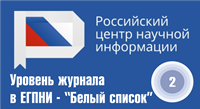СРАВНИТЕЛЬНЫЙ АНАЛИЗ СТРАТЕГИЙ СОВЛАДАНИЯ СО СТРЕССОМ У СТУДЕНТОВ В РАЗНЫХ УСЛОВИЯХ ОБУЧЕНИЯ В ПЕРИОД ПАНДЕМИИ
Аннотация
Целью исследования выделение различий в обращении студентов к стратегиям совладания при различных формах реализации образовательного процесса в условиях предложенных противоэпидемических подходов во время пандемии.
Материалы и методы. Представлены материалы эмпирического исследования, полученного на выборке студентов педагогических и медицинских вузов Красноярска и Гродно. Были опрошены 1356 студентов 2–4 курсов в возрасте 18–26 лет в феврале 2021 г. с помощью опросных методов.
Результаты. Полученные результаты дают возможность говорить о различиях в выборе копинг-стратегий студентами в зависимости от условий обучения и реализации противоэпидемических мер. Наиболее чаще студентами двух стран отмечаются стратегии активного когнитивного совладания, обращение к прошлому для предвосхищения возможных трудностей, обдумывание действий. При этом значимые различия наблюдаются в активных когнитивных копинг-стратегиях и принятием или отрицанием ситуации. Проведен анализ обращения к стратегиям совладания с учетом пола и профессиональной подготовки. Выявлено сходство общей направленности совладающего поведения юношей и девушек, при различии в стратегиях их реализации в зависимости от оценки ситуации, своих возможностей и ресурсов. Отмечается, что профессионализация обучающихся накладывает отпечаток на восприятие стрессогенности ситуации и способов ее восприятия: студенты специальностей (профилей) педагогической направленности являются наиболее уязвимой группой в совладании со стрессовой ситуацией обучения в условиях пандемии.
Скачивания
Литература
Список литературы
Бекова С.К. Уровень стресса студентов при переходе на дистанционный формат обучения // Мониторинг экономики образования: Информационно-аналитические материалы по результатам статистических и социологических обследований. 2021. Выпуск 7. С. 1–6.
Белинская Е.П., Вечерин А.В. Адаптация диагностического инструментария: опросник «Проактивный копинг» // Социальная психология и общество. 2018. Т. 9. № 3. С. 137—145. https://doi.org/10.17759/sps.2018090314
Васильева И.В., Дерягина Л.Е., Чуманов Ю.В. Психосемантическое исследование представлений студентов о дистанционном образовании в период пандемии COVID-19 // Экология человека. 2020. №12. С. 45–51. https://doi.org/10.33396/1728-0869-2020-12-45-51
Горбулина О.В., Колетвинова Е.Ю. Вынужденная корона 2020: успехи и трудности дистанционных технологий современного университета // Вестник Университета Правительства Москвы. 2020. № 3 (49). С. 56–64.
Гриценко В.В., Резник А.Д., Константинов В.В. и др. Страх перед коронавирусным заболеванием (COVID-19) и базисные убеждения личности [Электронный ресурс] // Клиническая и специальная психология. 2020. Т. 9. № 2. C. 99–118. https://doi.org/10.17759/cpse.2020090205
Грунт Е.В., Беляева Е.А., Лисситса С. Дистанционное образование в условиях пандемии: новые вызовы российскому высшему образованию // Перспективы науки и образования. 2020. № 5 (47). С. 45–58. https://doi.org/10.32744/pse.2020.5.3
Губенко С.И. Эпидемия COVID-19. Беларусь, Швеция, Швейцария и Дания. Аналитические расчёты, сравнение и прогнозы // Вестник науки и образования. 2020. № 16 (94). С. 50–68 https://doi.org/10.24411/2312-8089-2020-11601
Кисляков П.А. Психологическая устойчивость студенческой молодежи к информационному стрессу в условиях пандемии COVID-19 // Перспективы науки и образования. 2020. № 5 (47). С. 343–356. https://doi.org/10.32744/pse.2020.5.24
Крюкова Т.Л. Стили совладания с жизненными трудностями // Актуальные проблемы психологии личности: Сборник научных статей студентов, магистрантов и аспирантов по проблемам психологии. В 2-х частях. Гродно, 2012. Т.1. С. 83–101.
Первичко Е.И., Митина О.В., Степанова О.Б. и др. Восприятие COVID-19 населением России в условиях пандемии 2020 года [Электронный ресурс] // Клиническая и специальная психология. 2020. Т. 9. № 2. C. 119–146. https://doi.org/10.17759/cpse.2020090206
Приленский Б.Ю., Приленская А.В., Бухна А.Г., Канбекова Р.И., Боечко Д.И. Задачи психотерапии в условия эпидемии COVID-19 // Научный форум. Сибирь. 2020. Т. 6. № 2. С. 36–38.
Протько Н.Н., Патеюк И.В. Психическое здоровье в условиях вспышки COVID-19 // Психиатрия, психотерапия и клиническая психология. 2020. Т. 11. № 3. С. 556–569. https://doi.org/10.34883/PI.2020.11.3.012
Рассказова Е.И., Гордеева Т.О., Осин Е.Н. Копинг-стратегии в структуре деятельности и саморегуляции: психометрические характеристики и возможности применения методики COPE // Психология. Журнал Высшей школы экономики.2013. Т. 10. № 1. С. 82–118.
Рассказова Е.И., Леонтьев Д.А., Лебедева А.А. Пандемия как вызов субъективному благополучию: тревога и совладание // Консультативная психология и психотерапия. 2020. Т. 28. № 2. С. 90–108. https://doi.org/10.17759/cpp.2020280205
Уроки «Стресс-теста»: вузы в условиях пандемии и после нее. Аналитический доклад. / Ред. К.А. Баранников, О.В. Лешуков, О.Л. Назайкинская, Е.А. Суханова, И.Д. Фрумин. М.: НИУ ВШЭ, июнь 2020. 52 с.
Харламова Т.М. Специфика психического состояния и копинг-стратегий студентов при дистанционном обучении в условиях пандемии COVID-19 // Вестник Пермского государственного гуманитарно-педагогического университета. Серия 1. Психологические и педагогические науки. 2020. № 1. С. 26–39. https://doi.org/10.24411/2308-7218-2020-10103
Цветков А.И., Набойченко Е.С., Борзунов И.В., Вершинина Т.С. Последствия COVID-19 для психического здоровья общества: постановка проблемы, основные направления междисциплинарных исследований // Уральский медицинский журнал. 2020. № 6 (189). С. 95–101. https://doi.org/10.25694/URMJ.2020.06.21
Almarzooq Z.I., Lopes M., Kochar A. Virtual learning during the COVID-19 pandemic: a disruptive technology in graduate medical education // Journal of the American College of Cardiology. 2020. Vol. 75. N 20. P. 2635–2638. https://doi.org/10.1016/j.jacc.2020.04.015
Babore A., Lombardi L., Viceconti M.L. et al. Psychological effects of the COVID-2019 pandemic: Perceived stress and coping strategies among healthcare professionals // Psychiatry research. 2020. N 293. https://doi.org/10.1016/j.psychres.2020.113366
Carver C.S., Scheier M.F., Weintraub J.K. Assessing coping strategies: A theoretically based approach // Journal of Personality and Social Psychology. 1989. N 56(2). P. 267–283. https://doi.org/10.1037/0022-3514.56.2.267
Chandra Y. Online education during COVID-19: perception of academic stress and emotional intelligence coping strategies among college students // Asian Education and Development Studies. 2020. Vol. 10. N 2. P. 229–238. https://doi.org/10.1108/AEDS-05-2020-0097
Chornenka Zh. Peculiarities of teaching in higher educational institutions in the conditions of pandemia // International Independent Scientific Journal. 2020. N 17-2. P. 37–40.
Cruz M.F., Rodríguez J.Á., Ruiz I.Á., López C. et al. Evaluation of the Emotional and Cognitive Regulation of young people in a lockdown situation due to the Covid-19 pandemic // Frontiers in Psychology. 2020. Vol. 11. https://doi.org/10.3389/fpsyg.2020.565503
Ho C.S., Chee C.Y., Ho R.C. Mental health strategies to combat the psychological impact of COVID-19 beyond paranoia and panic // Annals of the Academy of Medicine, Singapore Ann Acad Med Singapore. 2020. Vol. 49. N 1. P. 1–3.
Jiao W.Y., Wang L.N., Liu J., Fang S.F., Jiao F.Y., Pettoello-Mantovani M., Somekh E. Behavioral and emotional disorders in children during the COVID-19 epidemic // The Journal of Pediatrics. 2020. Vol. 221. P. 264–266. https://doi.org/10.1016 / j.jpeds.2020.03.013
Labrague L.J., Ballad Ch.A. Lockdown fatigue among college students during the COVID-19 pandemic: predictive role of personal resilience, coping behaviours, and health // medRxiv. 2020. October 20. https://doi.org/10.1101/2020.10.18.20213942
Lee K., Fanguy M., Lu X.S., Bligh B. Student learning during COVID-19: It was not as bad as we feared // Distance Education. 2021. Vol. 42. N 1. P. 164–172. https://doi.org/10.1080/01587919.2020.1869529
Rotas E., Cahapay M. From stress to success: Exploring how Filipino students cope with remote learning amid COVID-19 pandemic // Journal of Pedagogical Sociology and Psychology. 2021. Vol. 3. N 1. P. 27–35. https://doi.org/10.33902/JPSP.2021366608
Szajnoga D., Klimek-Tulwin M., Piekut A. COVID-19 lockdown leads to changes in alcohol consumption patterns. Results from the Polish national survey // Journal of Addictive Diseases. 2020. N 1-12. P. 215–225. https://doi.org/10.1080/10550887.2020.1848247
Taylor S. COVID stress syndrome: Clinical and nosological considerations // Current psychiatry reports. 2021. Vol. 23. N 4. P. 1–7. https://doi.org/10.1007/s11920-021-01226-y
Voronin I.A., Manrique-Millones D., Vasin G.M. et al. Coping Responses during the COVID-19 Pandemic: A Cross-Cultural Comparison of Russia, Kyrgyzstan, and Peru // Psychology in Russia: State of the Art. 2020. N. 13(4). P. 55–74. https://doi.org/10.11621/pir.2020.0404
References
Bekova S.K. Uroven’ stressa studentov pri perekhode na distancionnyj format obucheniya [Stress level of students in the transition to distance learning format]. Monitoring ekonomiki obrazovaniya: Informacionno-analiticheskie materialy po rezul’tatam statisticheskih i sociologicheskih obsledovanij [Monitoring the economics of education: Information and analytical materials based on the results of statistical and sociological surveys], 2021, issue 7, pp. 1–6.
Belinskaya E.P., Veсherin A.V. Adaptaciya diagnosticheskogo instrumentariya: oprosnik «Proaktivnyj koping» [Adaptation of “Proactive coping inventory”]. Sotsial’naia psikhologiia i obshchestvo [Social Psychology and Society], 2018, vol. 9, no. 3, pp. 137–145. https://doi.org/10.17759/sps.2018090314
Vasileva I.V., Deryagina L.E., Chumanov Yu.V. Psihosemanticheskoe issledovanie predstavlenij studentov o distancionnom obrazovanii v period pandemii COVID-19 [Psychosemantic Research of Students’ Representations about Distance Education During COVID-19]. Ekologiya cheloveka [Human Ecology], 2020, no. 12, pp. 45–51. https://doi.org/10.33396/1728-0869-2020-12-45-51
Gorbulina O.V., Koletvinova E.Yu. Vynuzhdennaya korona 2020: uspekhi i trudnosti distancionnyh tekhnologij sovremennogo universiteta [Forced corona 2020: the strides and woes of remote technologies application in a modern university]. Vestnik Universiteta Pravitel’stva Moskvy [Bulletin University of Moscow Government], 2020, no.3(49), pp. 56–64.
Gritsenko V.V., Reznik A.D., Konstantinov V.V., et al. Strah pered koronavirusnym zabolevaniem (COVID-19) i bazisnye ubezhdeniya lichnosti [Fear of Coronavirus Disease (COVID-19) and Basic Personality Beliefs]. Klinicheskaia i spetsial’naia psikhologiia [Clinical Psychology and Special Education], 2020. Vol. 9, no. 2, pp. 99–118. https://doi.org/10.17759/cpse.2020090205
Grunt E.V., Belyaeva E.A., Lissitsa S. Distancionnoe obrazovanie v usloviyah pandemii: novye vyzovy rossijskomu vysshemu obrazovaniyu [Distance education during the pandemic: new challenges to Russian higher education]. Perspektivy nauki i obrazovania [Perspectives of Science and Education], 2020, no. 5(47), pp. 45–58. https://doi.org/10.32744/pse.2020.5.3
Gubenko S.I. Epidemiya COVID-19. Belarus’, Shveciya, Shvejcariya i Daniya. Analiticheskie raschyoty, sravnenie i prognozy [Epidemic COVID-19. Belarus, Sweden, Switzerland, Denmark. Analysis, comparisons and forecasts]. Vestnik nauki i obrazovaniya [Bulletin of Science and Education], 2020, no. 16(94), pp. 50–68.
Kislyakov P.A. Psihologicheskaya ustojchivost’ studencheskoj molodezhi k informacionnomu stressu v usloviyah pandemii COVID-19 [Psychological resistance of student youth to information stress in the COVID-19 pandemic]. Perspektivy nauki i obrazovania [Perspectives of Science and Education], 2020, no.47 (5), pp. 343–356. https://doi.org/10.32744/pse.2020.5.24
Kryukova T.L. Stili sovladaniya s zhiznennymi trudnostyami [Styles of coping with life’s difficulties]. Aktual’nye problemy psihologii lichnosti [Actual problems of personality psychology: Collection of scientific articles of students, undergraduates and graduate students on the problems of psychology]. In 2 parts. Grodno, 2012, vol. 1, pp. 83–101.
Pervichko E.I., Mitina O.V., Stepanova O.B., et al. Vospriyatie COVID-19 naseleniem Rossii v usloviyah pandemii 2020 goda [Perception of COVID-19 During the 2020 Pandemic in Russia]. Klinicheskaia i spetsial’naia psikhologiia [Clinical Psychology and Special Education], 2020, vol. 9, no. 2, pp. 119–146. https://doi.org/10.17759/cpse.2020090206
Prilensky B.Yu., Prilenskaya A.V., Bukhna A.G., Kanbekova R.I., Boechko D.I. Zadachi psihoterapii v usloviya epidemii COVID-19 [The tasks of psychotherapy in the context of the COVID-19 epidemic]. Nauchnyj forum. Sibir’ [Scientific forum. Siberia], 2020, vol. 6, no. 2, pp. 36–38.
Protko N., Pateyuk I. Psihicheskoe zdorov’e v usloviyah vspyshki COVID-19 [Mental health in conditions of COVID-19]. Psihiatriya, psihoterapiya i klinicheskaya psihologiya [Psychiatry, Psychotherapy and Clinical Psychology], 2020, vol. 11, no. 3, pp. 556–569. https://doi.org/10.34883/PI.2020.11.3.012
Rasskazova E.I., Gordeeva T.O., Osin E.N. Koping-strategii v strukture deyatel’nosti i samoregulyatsii: psikhometricheskie kharakteristiki i vozmozhnosti primeneniya metodiki COPE [Coping Strategies in the Structure of Activity and Self-Regulation: Psychometric Properties and Applications of the COPE Inventory]. Psikhologiya. Zhurnal Vysshei shkoly ekonomiki [Psychology. Journal of the Higher School of Economics], 2013, vol. 10 (1), pp. 82–118.
Rasskazova E.I., Leontiev D.A., Lebedeva A.A. Pandemiya kak vyzov sub”ektivnomu blagopoluchiyu: trevoga i sovladanie [Pandemic as a Challenge to Subjective Well-Being: Anxiety and Coping]. Konsul’tativnaya psikhologiya i psikhoterapiya [Counseling Psychology and Psychotherapy], 2020, vol. 28, no. 2, pp. 90–108. https://doi.org/10.17759/ cpp.2020280205
Uroki «Stress-testa»: vuzy v usloviyakh pandemii i posle nee. Analiticheskiy doklad [Lessons from the “Stress test”: universities in a pandemic and after it. Analytical report.]. Ed. K.A. Barannikov, O.V. Leshukov, O.L. Nazaykinskaya, E.A. Sukhanova, I.D. Frumin]. M.: NIU HSE, 2020, 52 p.
Kharlamova Т.М. Specifika psihicheskogo sostoyaniya i koping-strategij studentov pri distancionnom obuchenii v usloviyah pandemii COVID-19 [Specificity of the mental state and coping strategies of students during the period of remote learning in the context of the COVID-19 pandemic] Vestnik Permskogo gosudarstvennogo gumanitarno-pedagogicheskogo universiteta. Seriya 1. Psihologicheskie i pedagogicheskie nauki [Bulletin of the Perm State Humanitarian Pedagogical University. Series 1. Psychological and pedagogical sciences], 2020, no.1, pp. 26–39. https://doi.org/10.24411/2308-7218-2020-10103
Tsvetkov А.I., Naboichenko E.S., Borzunov I.V., Vershinina T.S. Posledstviya COVID-19 dlya psihicheskogo zdorov’ya obshchestva: postanovka problemy, osnovnye napravleniya mezhdisciplinarnyh issledovanij [Consequences of COVID-19 on the mental health of society: statement of the problem and main directions of interdisciplinary research]. Ural’skij medicinskij zhurnal [Ural Medical Journal], 2020, no. 06 (189), pp. 95–101, https://doi.org/10.25694/URMJ.2020.06.21
Almarzooq Z.I., Lopes M., Kochar A. Virtual learning during the COVID-19 pandemic: a disruptive technology in graduate medical education. Journal of the American College of Cardiology, 2020, vol. 75, no. 20, рр. 2635–2638. https://doi.org/10.1016/j.jacc.2020.04.015
Babore A., Lombardi L., Viceconti M.L., et al. Psychological effects of the COVID-2019 pandemic: Perceived stress and coping strategies among healthcare professionals. Psychiatry research, 2020, no. 293. DOI:10.1016/j.psychres.2020.113366
Carver C.S., Scheier M.F., Weintraub J.K. Assessing coping strategies: A theoretically based approach. Journal of Personality and Social Psychology, 1989, no. 56(2), pp. 267–283. https://doi.org/10.1037/0022-3514.56.2.267
Chandra Y. Online education during COVID-19: perception of academic stress and emotional intelligence coping strategies among college students. Asian Education and Development Studies, 2020, vol. 10, no. 2, pp. 229–238. https://doi.org/10.1108/AEDS-05-2020-0097
Chornenka Zh. Peculiarities of teaching in higher educational institutions in the conditions of pandemia. International Independent Scientific Journal, 2020, no. 17-2, pp. 37–40.
Cruz M.F., Rodríguez J.Á., Ruiz I.Á., López C. et al. Evaluation of the Emotional and Cognitive Regulation of young people in a lockdown situation due to the COVID-19 pandemic. Frontiers in Psychology, 2020, vol. 11. https://doi.org/10.3389/fpsyg.2020.565503
Ho C.S., Chee C.Y., Ho R.C. Mental health strategies to combat the psychological impact of COVID-19 beyond paranoia and panic. Annals of the Academy of Medicine, Singapore Ann Acad Med Singapore, 2020, vol. 49, no. 1, pp. 1–3.
Jiao W.Y., Wang L. N., Liu J., Fang S. F., Jiao F. Y., Pettoello-Mantovani M., Somekh E. Behavioral and emotional disorders in children during the COVID-19 epidemic. The Journal of Pediatrics, 2020, vol. 221, pp. 264–266. https://doi.org/10.1016/j.jpeds.2020.03.013
Labrague L.J., Ballad Ch.A. Lockdown fatigue among college students during the COVID-19 pandemic: predictive role of personal resilience, coping behaviours, and health. medRxiv, 2020, October 20. https://doi.org/10.1101/2020.10.18.20213942
Lee K., Fanguy M., Lu X.S., Bligh B. Student learning during COVID-19: It was not as bad as we feared. Distance Education, 2021, vol. 42, no. 1, pp. 164–172. https://doi.org/10.1080/01587919.2020.1869529
Rotas E., Cahapay M. From stress to success: Exploring how Filipino students cope with remote learning amid COVID-19 pandemic. Journal of Pedagogical Sociology and Psychology, 2021, vol. 3, no. 1, pp. 27–35. https://doi.org/10.33902/JPSP.2021366608
Szajnoga D., Klimek-Tulwin M., Piekut A. COVID-19 lockdown leads to changes in alcohol consumption patterns. Results from the Polish national survey. Journal of Addictive Diseases, 2020, no. 1–12, pp. 215–225. https://doi.org/10.1080/10550887.2020.1848247
Taylor S. COVID stress syndrome: Clinical and nosological considerations. Current psychiatry reports, 2021, vol. 23, no. 4, pp. 1–7. https://doi.org/10.1007/s11920-021-01226-y
Voronin I.A., Manrique-Millones D., Vasin G.M., et al. Coping Responses during the COVID-19 Pandemic: A Cross-Cultural Comparison of Russia, Kyrgyzstan, and Peru. Psychology in Russia: State of the Art, 2020, no. 13(4), pp. 55–74. https://doi.org/10.11621/pir.2020.0404
Просмотров аннотации: 507
Copyright (c) 2022 Anna A. Dyachuk, Andrei I. Shpakou, Julia Ju. Bocharova, Liudmila G. Klimatckaia

Это произведение доступно по лицензии Creative Commons «Attribution-NonCommercial-NoDerivatives» («Атрибуция — Некоммерческое использование — Без производных произведений») 4.0 Всемирная.





































